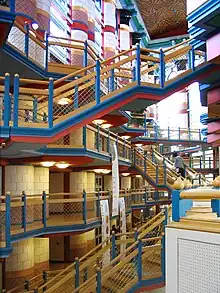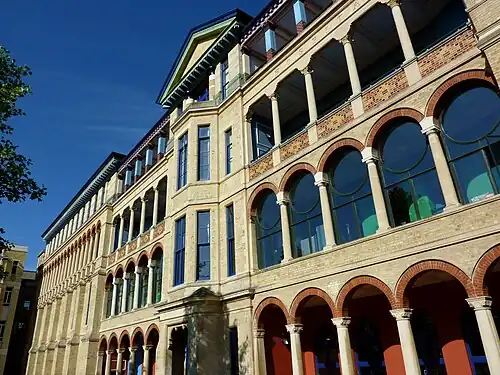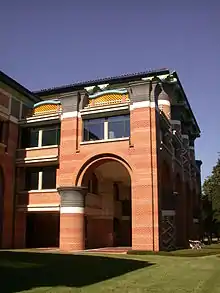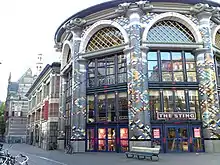John Outram | |
|---|---|
 | |
| Born | 21 June 1934 Taiping, Malaya |
| Nationality | British |
| Occupation | Architect |
| Practice | John Outram Associates |
| Buildings | ANNE & CHARLES DUNCAN HALL, Rice University, Houston, Texas[1] |
John Outram (born 21 June 1934) is a British architect. He established a practice in London in 1974 and produced a series of buildings in which polychromy and Classical allusions were well to the fore. Among his works are the temple-like Storm Water Pumping Station, Isle of Dogs, London (1985–8), the New House at Wadhurst Park, Sussex (1978–86), the Judge Institute of Management Studies in Cambridge (1995), and the Computational Engineering Building (Duncan Hall), Rice University, Houston, Texas (1997).
The New House, Sussex
The New House on the Wadhurst Park estate was completed in 1986 for Hans Rausing. It was described by a British critic as "probably the best house built since the war. It is inspired by classical proportions, yet is absolutely original."[2] In 1999–2000 he added a Millennium Verandah to the house,[3] featuring columns inspired by Indian, Sumerian, and other cultures.
Pumping Station, Isle of Dogs, London, 1986
In the mid 1980s, the London Docklands Development Authority awarded contracts for three storm-water pumping stations to Richard Rogers, Nicholas Grimshaw, and Outram.[5] The buildings are unoccupied and secure. Outram designed a "monumental temple"[6] with which he hoped to situate the viewer "within a Landscape of Symbols".[5] The pumping station was listed at Grade II* in 2017. This was the first listing as a result of Historic England’s Post-Modernism project. The announcement was made to coincide with the London Festival of Architecture.[7]
Cambridge Judge Business School, 1995


The extensions and re-organization of Digby Wyatt's Addenbrooke's Old Hospital as the Judge Institute of Management Studies (now called the Cambridge Judge Business School),[1] Cambridge (1993–5), combines the language of Classical architecture with the engineering components necessary in a modern building.

Services, along with access ladders, were placed inside hollow pillars and incorporated within what Outram has called the ‘Robot Order’ (Ordine Robotico). One critic described this as "the invention of a Sixth Order, an act of sheer Architectural terrorism',[8] and by another as "...a collection of places, at once archaic and hypermodern",[9] neither exposed nor hidden away, but used to validate a new architectural order visible throughout the building as the columns and beams large enough to contain the mechanisms needed by Modernity. The reason for this novel re-invention of the "tabooed" Architectural Order was to restore to Architecture the "literate decorum" that was also placed under a taboo after WWII.
Computational Engineering Building (Duncan Hall), Rice University, Houston, Texas, 1996

Outram designed the new building for the Computational Engineering department at Rice University in Houston, Texas, named Anne and Charles Duncan Hall in honor of outgoing Chair of the University Board of Directors Charles Duncan, Jr. When completed, it was the largest new building on this 100-year-old Campus. It stands next to its oldest building, "one of Houston's most revered architectural monuments".[10]
Other buildings

Other buildings include the Egyptian House in Oxfordshire (2000), Craft Workshops, Welbeck Abbey, Nottinghamshire (2000), and a retail development at the Old Town Hall, The Hague, The Netherlands (2000), in which Egyptianizing, Classical, and other historical references are "treated with verve and imagination"[11]

National Life Stories conducted an oral history interview (C467/86) with John Outram in 2007 for its Architects Lives' collection held by the British Library.[12]
Notes
- 1 2 Pearman, Hugh. "John Outram's "Egyptian House" in Oxfordshire". Gabion. Archived from the original on 10 July 2001. Retrieved 10 September 2012.
- ↑ Jackson-Stops, Gervase (20 August 1989). Sunday Times.
{{cite news}}: Missing or empty|title=(help) - ↑ "The Millennium Verandah: The new house, Wadhurst, East Sussex". Concrete. 1 October 2000. Archived from the original on 16 November 2018. Retrieved 10 September 2012 – via HighBeam Research.
- ↑ "The New House, including orangery, Millennium Pavilion, terraces and all hard landscaping by John Outram Associates, Wadhurst - 1457638 | Historic England".
- 1 2 Outram, John. "Pumping Station, Isle of Dogs".
- ↑ Rose, Steve (11 September 2011). "Contemporary architecture: examples from the era". The Guardian. Retrieved 10 September 2012.
- ↑ "Iconic Post-Modern Pumping Station Given Listed Status | Historic England". historicengland.org.uk. Retrieved 4 January 2023.
- ↑ Architecture Today, November 1995.
- ↑ Abitare, November 1996.
- ↑ Outram, John. "ANNE & CHARLES DUNCAN HALL, Rice University, Houston, Texas".
- ↑ Oxford Dictionary of Architecture and Landscape Architecture. OUP.
- ↑ National Life Stories, 'Outram, John (1 of 27) National Life Stories Collection: Architects' Lives', The British Library Board, 2007. Retrieved 10 April 2018
External links
- Official website
- http://www.architecture.uwaterloo.ca/faculty_projects/terri/gallery2/duncan_hall.html*
- Wainwright, Oliver (4 May 2022). "'I've been dug up!' – the dazzling rebirth of 'architectural terrorist' John Outram". The Guardian. Retrieved 4 May 2022.